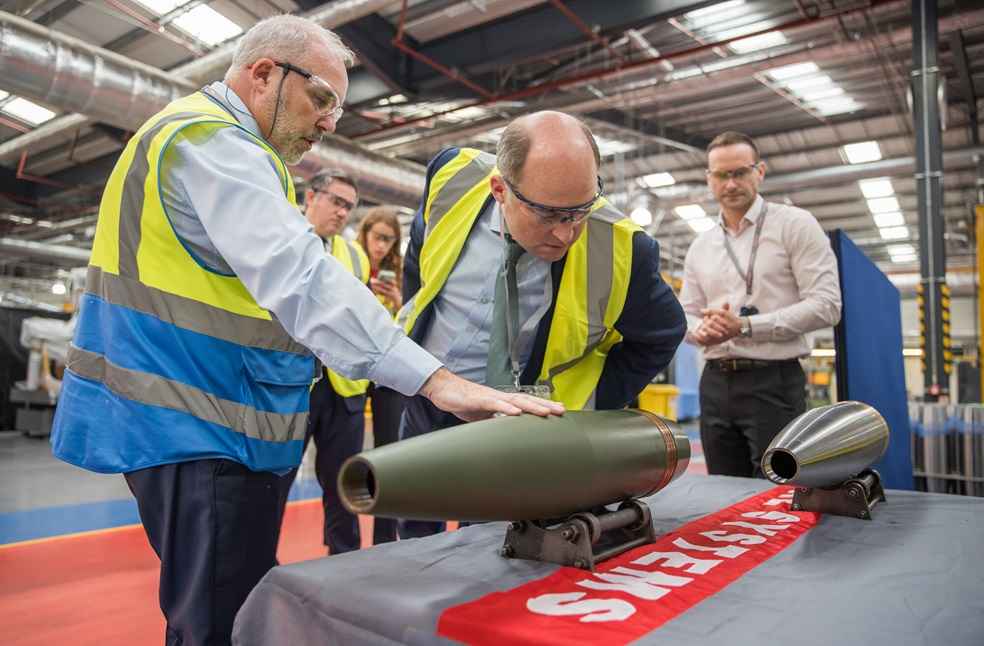
Israel’s Gaza war is boosting profits for BAE System.
One Year After Oct. 7, Arms Industry Stocks
Way Outperformed the S&P 500 Index Fund
Eli Clifton / Responsible Statecraft
(October 7, 2024) — It’s hard to see the past year in the Middle East as anything other than an unmitigated disaster.
Over 41,000 Palestinians have been killed in Gaza by Israel’s nearly yearlong bombardment of the territory, and significant obstruction of food and medicine shipments as a form of collective punishment against the population following Hamas’ October 7, 2023, attack across the border that claimed 1,163 Israeli lives.
But not everyone has been harmed in the rapidly spiraling conflict. Investors in weapons stocks have enjoyed record gains over the past year, dramatically outperforming the major stock indexes in a stock rally that analysts are attributing to violence and instability in the Middle East.
The war has now spread to Lebanon, which Israel invaded last week, and Iran, where Israel assassinated leaders of the IRGC, Hezbollah and Hamas, actions that Iran retaliated against with massive strikes against targets inside Israel.
How Israel pursues its murky war aims in both Lebanon and the Gaza Strip, as well as a promised escalation against Iran, remains to be seen. The Biden administration, having spent the better part of the year promising an imminent ceasefire in Gaza and quietly urging Israel to show greater care for protecting civilian lives, has little to show for its efforts as the U.S. simultaneously continues to provide billions of dollars of weapons to Israel to execute on its rapidly expanding war.
That handout of taxpayer funds to Israel coupled with Israel’s, and global, demand increasing for weapons in a period of instability, has been jet fuel for stock prices.
Lockheed Martin, the world’s largest weapons firm and the manufacturer of the F-35 aircraft that Israel uses in its regular bombings of Gaza, at the close of trading on October 4, has produced a 54.86% percent total return in the one year following the October 7th attacks, outperforming the S&P 500 by about 18%.
Or, put another way, a $10,000 investment in the F-35 manufacturer right before the October 7 attacks would, one year later, have produced a $5,486 total return. A similar investment in an S&P 500 index fund would have produced only $3,689.
The weapons profits weren’t limited to Lockheed.
The second largest weapons firm, Raytheon, provides “bunker buster” bombs to Israel, weapons that are prohibited for use in areas with high civilian populations. Israel has repeatedly used these weapons in high density areas in both Gaza and Lebanon, producing high civilian casualties.
Demand for these weapons and others have driven up Raytheon’s stock price and generated massive returns for investors. Raytheon’s total return for investors in the past year is 82.69%, outperforming the S&P 500 by about 46%. A $10,000 investment in Raytheon before the October 7 attacks would have produced a $8,269 total return.
Another producer of bunker busters, General Dynamics, which produced the BLU-109 bombs used by Israel to assassinate Hezbollah leader Hassan Nasrallah in Beirut and leveled multiple residential buildings in the process, enjoyed smaller gains but still returned a 37% total return for investors, beating the S&P 500 by over 3%.
While profiting off war may be distasteful for some, defense analysts at major investment banks grilled weapons executives in earnings calls last October about how the companies, and their investors, might profit from the war in Gaza.
“Hamas has created additional demand, we have this $106bn request from the president,” said TD Cowen’s Cai von Rumohr, during General Dynamics’earnings call on October 25, 2023. In a question posed to General Dynamics executives on the call, von Rumohr asked, “Can you give us some general color in terms of areas where you think you could see incremental acceleration in demand?”
One year later, those analysts have been proven correct and Israel’s war grinds on as the White House finds its bids for ceasefires repeatedly rejected while, in seeming contradiction, supplying Israel with the weapons to continue fighting.
On September 26, the White House approved a $8.7 billion aid package for Israel that will largely be spent on munitions and armaments from major weapons firms, bringing the total U.S. security assistance to Israel since October 7 to nearly $18 billion. The same day, Israel, in defiance of the U.S., rejected a call for a ceasefire with Hezbollah, no doubt driving “incremental acceleration in demand” for weapons.
Eli Clifton is a senior advisor at the Quincy Institute and Investigative Journalist at Large at Responsible Statecraft. He reports on money in politics and U.S. foreign policy.
The views expressed by authors on Responsible Statecraft do not necessarily reflect those of the Quincy Institute or its associates.